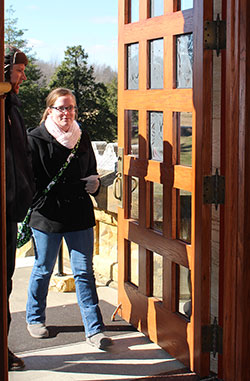Catholic Schools Week Supplement
Spiritual development of school staffs is key to achieving ultimate goal

Alan Mathews, left, and Samantha Strom walk through the holy door at the Archabbey Church of Our Lady of Einsiedeln in St. Meinrad on Jan. 18. Mathews and Strom are faculty members of Our Lady of Providence Jr./Sr. High School in Clarksville who respectively teach Spanish and science. Providence’s faculty and staff went on a retreat focused on the Holy Year of Mercy at Saint Meinrad Archabbey. (Submitted photo)
By Sean Gallagher
All schools encourage their faculty to develop themselves professionally and often offer opportunities for such growth.
Catholic schools across central and southern Indiana also go a step further and seek to foster the faith of those who teach students and serve as administrators. This, in turn, helps Catholic school teachers and leaders pass that faith on to their students.
The faculty and staff of Our Lady of Providence Jr./Sr. High School in Clarksville nurture their faith during an annual retreat.
This academic year, the retreat was centered on the Church’s Holy Year of Mercy that began in December. The retreat took place on Jan. 18 at Saint Meinrad Archabbey in St. Meinrad.
Educators heard a presentation on the importance of mercy in the life of faith, celebrated the Eucharist, had the opportunity to experience the sacrament of penance, and walked as a group through the holy door of the Archabbey Church of Our Lady of Einsiedeln and said the prayers required to receive the holy year’s plenary indulgence.
“It was very powerful,” said Melinda Ernstberger, Providence’s principal. “It was a moment in time when we were taken out of our ordinary environment, and provided with a spiritual journey and reflection. The Spirit was working there.”
Leah Kelly, Providence’s director of campus ministry, thinks the retreat will help the school’s faculty and staff be more effective in their work.
“Coming together to share in something that can be such a personal experience of your own relationship with God only further unites us and makes us a stronger community coming back here,” she said. “We can only share with the students what we have ourselves. So having these opportunities helps us grow in our relationship with Christ. Ultimately, that’s what we strive to help our students do every day as well.”
Focusing on the Holy Year of Mercy during the retreat, Ernstberger said, will help the Providence community deepen its commitment to offering opportunities for “authentic service” to its students. The school is in the midst of a three-year period of working on this as a goal for improving its Catholic identity.
Ultimately, Ernstberger said, Providence seeks through its Catholic identity to help students have an encounter with Christ and grow in relationship with him and the Church.
Providing for the spiritual development of the faculty and staff furthers this goal.
“If we really want to do something extraordinary in faith for our kids, we have to start with the faculty and staff,” Ernstberger said. “We have to model it for them. We have to cheerlead it. We have to feel it deeply ourselves.”
The administrators and religious studies faculty at Roncalli High School in Indianapolis have sought to grow in their faith in order to help their students do the same by studying Forming Intentional Disciples: The Path to Knowing and Following Jesus by Catholic author Sherry Weddell.
In the 2012 book, Weddell draws on social science and polling data to show the challenge facing the Church today in helping Catholics grow in their faith and remain committed to being followers of Christ.
She then lays out an array of suggestions to help the Church help Catholics grow in their relationship with Christ, and be more intentional in living out their faith on a daily basis.
Leaders in the archdiocesan Office of Catholic Schools have encouraged administrators of Catholic high schools across central and southern Indiana to study the book and consider its relevance for their particular situation.
Roncalli principal Chuck Weisenbach was impressed by the effect that Forming Intentional Disciples had on him and fellow school leaders.
“We’ve never had amongst our administrative team a more robust and passionate dialogue than the one we’ve had over that book, its context and what it means for us as a school and a Church,” he said. “It continually brought us back to the title and purpose of the book—forming intentional disciples. There is no greater challenge nor greater calling or responsibility for a Catholic school than to do just that.”
Focusing on this goal, Weisenbach said, is crucial for Catholic schools in an educational setting in Indiana that has “never been more competitive.” Because parents have a broad array of educational options for their children, schools like Roncalli need to work continually on improving their academic, athletic and fine arts programs.
“That’s nice, and I’m glad we have those things,” Weisenbach said. “But if we did all of those things well and weren’t forming intentional disciples, then obviously we would have fallen woefully short.”
As director of campus ministry and chairperson of religious studies at Roncalli, Jeff Traylor works to achieve this goal at the Indianapolis South Deanery interparochial high school.
He said Forming Intentional Disciples has helped the religious studies teachers re-examine every aspect of their work in their classrooms in light of the goal of helping their students grow in their relationship with Christ and the Church.
Traylor noted, “How can we continue to make these things engage these kids in their faith, challenge them, and cause them to challenge back, so that they can learn and understand it on a personal level, not just on a factual level?” †
